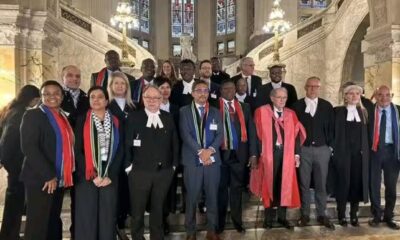
OpEds

Ramaphosa’s optimism on ICJ case has little merit
President Cyril Ramaphosa appears optimistic about his government’s prospects of winning the International Court of Justice (ICJ) case against Israel. However, this could be misguided.
Following the interim orders issued by the ICJ in the case, he addressed Parliament on 29 August, saying that his administration was in the process of preparing an “almost 500-page case” for the ICJ, and that South Africa would prove that a genocide was taking place in Gaza.
He then repeated his view that the only solution for “the horror that is unfolding in Palestine” is for Palestinians to have their own state “side by side with Israel”. Charitably interpreted, each of these statements appear to be steeped in the naivete of a blinkered and partisan ideologue.
First, the length of a party’s papers doesn’t of itself say anything about the merits of its case. If the rule of thumb in litigation were that the party with the heftier volume of papers was the one more likely to prevail, then not all the unharvested timber in the world would suffice to accommodate the appetite for lengthy and lengthier court papers.
Second, and as to the president’s expression of confidence in South Africa’s prospects of success, I trust that his legal advisers at the very outset informed him that a full prosecution of South Africa’s case would, especially at the merits stage, be very, very expensive. A team of four or five local silks and four of five junior advocates assisted by several other Pound-earning foreign advocates is unlikely be to be paid at legal-aid rates.
The very reason why the government will be sure to brief so large a legal team is that unlike what may occur at a provisional or interim stage, at the final hearing, a charge of state genocide is notoriously hard to prove. Where a state is charged with the crime of crimes – genocide – the bar of proof is, by design, set very high indeed.
The ICJ has previously held that to sustain a charge of genocidal intent, the prosecution must prove intention at the level of dolus specialis – essentially a specific and direct intention to commit genocidal crimes. In terms of the ICJ’s own binding precedent, prosecutors need to show that the intent of committing genocide “is the only reasonable inference” that can be drawn from the facts.
If the preliminary hearings are any indication, South Africa’s case on the merits will be heavily based on statements made by Israeli officials vested with command authority or responsibility. Thus, the somewhat bellicose statements made by President Isaac Herzog, Prime Minister Benjamin Netanyahu, and Defence Minister Yoav Gallant during the anguished aftermath of 7 October 2023 are likely to be proffered as evidence of Israel’s alleged genocidal intent. However, it’s trite that in law, as in so much in life, context is everything. Apart from each of these three leaders having clarified that their statements were directed at the destruction of Hamas and not the people of Gaza, there’s also this very pertinent context.
A powerful, highly-armed state, Iran, has as its sworn and oft repeated aim the utter obliteration of another. It’s thus to be expected that in the context of an Iranian proxy’s invasion and slaughter, Israel’s leaders in their reaction to the infamy of 7 October, might – and likely would – make patriotic and sometimes bombastic speeches intended to boost the morale of a society under frenzied yet sustained attack.
In war, leaders harness and give expression to society’s anger at the enemy. In a speech made on the day after the Nazi invasion of the Soviet Union, Sir Winston Churchill promised, “We shall bomb Germany by day as well as by night in ever-increasing measure, casting upon them month by month a heavier discharge of bombs and making the German people taste and gulp each month a sharper dose of the miseries they have showered upon mankind.”
The historical context in which the above speech was made would give the lie to any counterfactual and revisionist claim that the Royal Air Force’s subsequent years-long mass bombing of the German civilian population constituted a crime of genocide.
At the interim hearings before the ICJ, South Africa’s written charges were largely advanced through references in footnotes, which were proffered as evidence in support of its allegations. These footnote references were themselves peppered with disputed and carefully selected statements and reports. If the ICJ is to remain a court of law bound by its own precedents, this sort of evidence won’t suffice at the final hearing on the merits of South Africa’s case.
Third, the president ought to have known that a Jewish state, understandably, recoils from outsiders advising it on its only “solution”, and that Israel is also entirely unconvinced that the envisaged state of Palestine would mean peace. After the 2005 withdrawal, Gaza could have been a prototype of a sustainable and prosperous Palestinian entity. It instead became an armed camp. Although Gaza is just 40km in length, its underground network of tunnels traversed an area of about 480km. This underground military installation was built by Hamas at an estimated cost of $1 billion dollars. As the saying goes, for the past two decades Hamas spent the resources of Gaza “building down but never up”.
South Africa’s legal team would be aware of the difficulties involved in proving a case of genocide. On 4 April 2024, the ICJ fixed the dates by which the parties are to file their respective pleadings, known as “memorials”, on the merits. South Africa is required to submit its memorial by 28 October 2024. Just as this piece was being finalised, news broke that South Africa’s lawyers are attempting to extend the October deadline by several months. In litigation, it’s most often the party bringing the case – the plaintiff – who seeks to expedite the hearing and it’s the defendant who might seek to delay proceedings. South Africa’s requested postponement is therefore surprising, and indicates that the president’s confidence in the adequacy of South Africa’s “almost 500-page” case was misplaced.
In any event, the president’s views on the only solution won’t fall on receptive ears. Hamas’s founding charter proclaims that its solution isn’t neighbourly co-existence but rather the total elimination of Israel. Israel’s founding document, the Declaration of Independence, states that Israel seeks peace but will remain ever prepared to defend itself.
Between these two contrary poles, and for so long as Hamas sets the Palestinian agenda, the emergence of a state of Palestine existing side by side with Israel will remain more illusion than solution.
- Gavin Rome is a senior counsel at the Johannesburg Bar.











Mark Wade
September 12, 2024 at 12:52 pm
While the request/demand of a ‘two-state solution’ appears to be the mantra of those supporting the genocide against Israel, the questions is; ‘where and how will this two-state solution be constructed’? There already is Hamas-controlled Gaza, Egypt-controlled Sinai, and PA/Fatah-controlled ‘West Bank’ (historically Jewish land of Judea and Samaria). Does the world expect Israel to divide its slither of land into smaller pieces – a piece of land about the size of South Africa’s Kruger National Park? And further, that ‘two-state solution’ is unlikely to stop the savage attacks by Jew-hating Islamic fundamentalists, and Gaza is a case in point. Their objective is the total annihilation of Israel, not a peace deal. The British Mandate of 1922 – when the British and French Sykes/Picot arrangement carved-up the Middle East after the collapse of the 400-year long Ottoman Empire reign – clearly stated the Transjordan (today’s Jordan) would be ‘Arab Palestine’, and present day Israel, including the West Bank, Sinai and Gaza, would be ‘Jewish Palestine’. Israel should have a right to claim back all that land, not return to some fictitious ‘1967 borders’.
yitzchak
September 17, 2024 at 7:57 am
Nothing convinces me that the Palestinians both Hamas and the PLO faction have accepted a 2 state solution.
After the recent ICJ opinion on the status of the West Bank Gaza and East Jeroosalem, Riyad Mansour the Palestinian rep at the UN said “we applaud this decision with the right of return of Palestinian refugees”.
So much for acceptance of a 2 state solution.
The SA govt need to convince its allies in Hamas and the PA what 2 states side by side means.